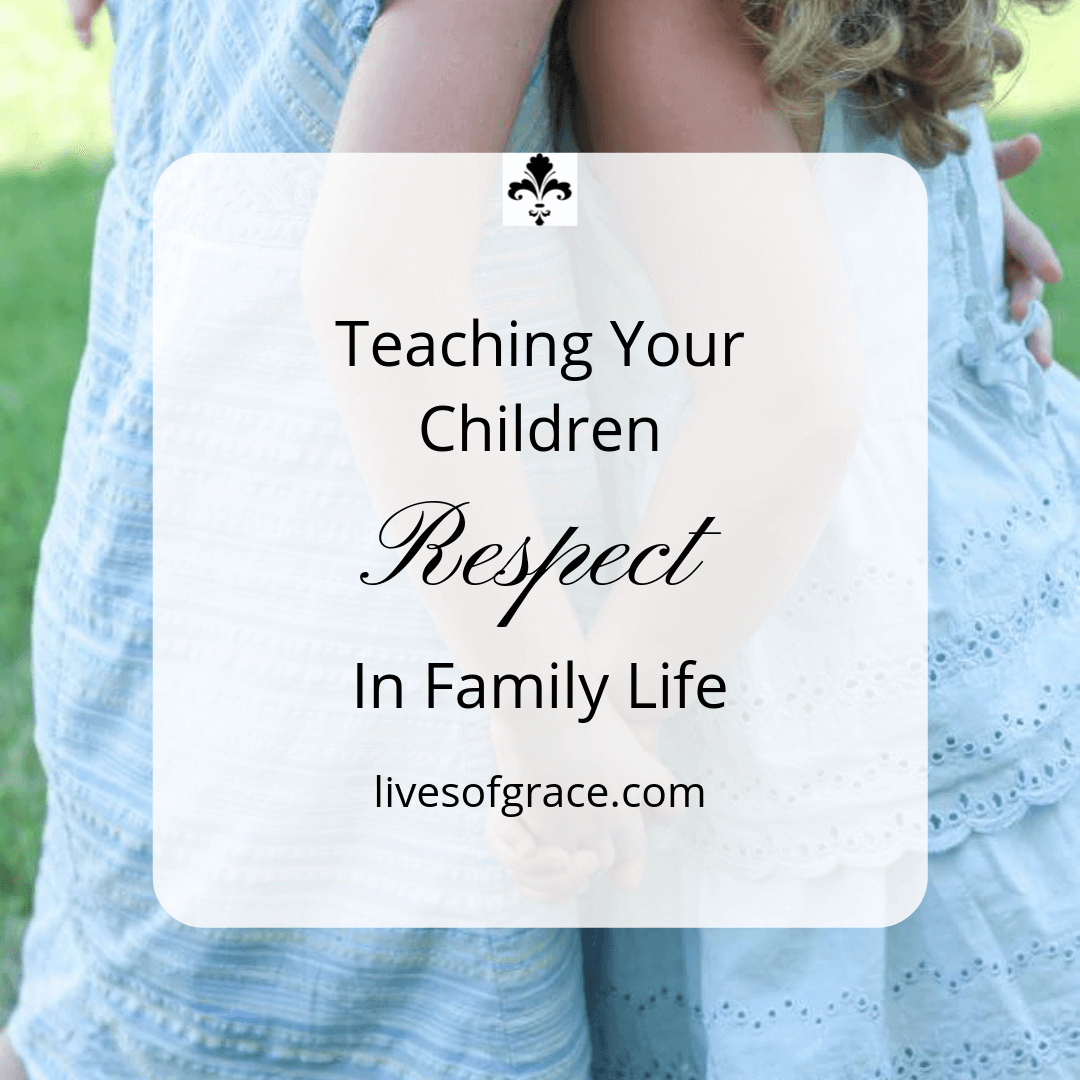Teaching your children the habit of respect is one of the most important virtues you can nurture in them. As with all virtues, children don’t come out of the womb naturally living respect. The home is the ideal place to help your children learn how to respect people of all ages. For family life to run smoothly, we need to care of the emotional environment of our homes. Respect is one of those components of that environment. (You can find the other keys to a good emotional environment in your home HERE.)
There are a few different areas where we need to show and develop respect.
- Respect between spouses
- Children respecting parents
- Parents respecting children
- Respect with siblings
Respect Between Spouses
As with every aspect of our lives, our children are influenced more by what we model than by what we tell them to do. It is critical to their feelings of safety and security that children see their parents respect and honor each other. Parents should avoid arguing in front of children (and just because you close the bedroom door doesn’t mean they can’t hear you or feel the tension of an argument).
Spouses should be very careful in the way they argue – not only for the good of their relationship, but because children hear harsh words and name calling….and they don’t forget. If you call your husband names when you’re angry, you automatically force your children to choose if they believe that about their dad. That’s a terrible position to put your children in.
Do you show your children that your husband is the most important person in your life and do you speak to him lovingly? Do you listen to him? Do you avoid complaining about him to others? Do you demand that your children respect your husband (their father)? Does your husband demand that the children treat you with respect and honor?
If you find there’s disrespect in your relationship with your husband, have a candid conversation with him, and discuss how disrespect between the two of you will undercut your parenting and teach your children to disrespect you both.
Teaching Children to Respect Their Parents
We can all agree that a 30-year-old should not stamp his foot and shout, “I hate you” of “Shut up” at a boss who tells him he needs to stay late. Why is it ok for small children to tell you “no” or say, “I hate you?” It is a disorder in the family that will affect family life for a long time.
If we don’t teach them how to respect and honor us (Honor your father and your mother), no one else will. That will be a serious failing on our part – one for which we will have to answer to God. It also sets up a spiritual problem for them. Teaching our children that we are the boss, the rule setter, the final word helps the children understand their relationship with God. He is the boss, the rule setter, the final word and the One Who loves us more than anyone. If our children have not experienced that with physical parents, it is very hard for them to experience it with a heavenly Father whom they cannot see or touch.
Leonard Sax, PhD, is a family physician, psychologist, and author of many excellent parenting books. He wrote about an office visit with a 10 yr old boy who was sitting and playing a game on his mobile phone, ignoring his mother and Dr. Sax as they were talking about the boy’s stomachaches. As his mother is describing his stomachaches, the boy says, “Shut up, mom, you don’t know what you’re talking about.” And the boy laughs.
It’s Shocking How Some Children Speak to Parents
When you read that, does it shock you? It shocked me! Never in a million years should a child speak to a parent (much less any adult or person, really) with such disrespect.
Although, to be honest, I have heard mothers allow their children to speak to them this way – even as young as 3! As a mother of 7, all of them grown now, I cannot emphasize enough that if you have respect problems with your children when they are toddlers, you can’t even imagine the respect problems you will have with them in their teens! You have already given them control of the home and situations. You have already given them the unspoken message that you don’t respect yourself, and you have stepped down from your role as parent.
The interior chaos that your surrender causes your child is unsettling and anxiety ridden. You and your husband are supposed to be the adults. You both are supposed to protect your children and teach them how to treat people. DO NOT relinquish that role because you find the confrontation difficult. Trust me, it only gets more difficult as they get older.
Respecting Our Children
It’s hard to keep patience all day every day. And as humans, we will fall and falter more times than we would like. But if you find that your impatience or stress turns to disrespect of the children, that needs to be your primary focus of change each day. Whether the bathrooms are clean or not, how you speak to your child is the highest priority.
NO child should ever hear, “Are you stupid?” “Why are you so stupid?” “Don’t be an idiot.” “Shut up.” Those types of phrases sink deep into a child’s mind. It attacks their self-confidence and self-esteem and leaves them wondering if maybe they are stupid or an idiot.
Start today figuring out what and where your trigger points are. Then, before your impatience and disrespect is triggered, decide what your plan of action will be to remove yourself from the escalating emotions.
We also respect our children by teaching them how to live, rather than just managing how they live. You can find more about that in this POST.
It is Never Too Late to Begin Again
If you find yourself saying, “I’ve already blown the respect thing. I’ve yelled at my kids too many times. I’ve lost my patience. I can’t do this because I haven’t done this well.”
Realize that children are forgiving if they sense you are humble in your acknowledgement of past mistakes and desire to change in the future. Look at them as if they are the Christ child Himself. That will change how you see your children and how you behave towards them. Eventually, you will acquire the habits that keep you calm and reduce the yelling.
You will not always be perfect. It is the human condition to mess up. That’s why we seek forgiveness, and vow to begin again. Seeking forgiveness is not throwing yourself at the feet of your toddlers begging for forgiveness. It can mean an apology, and an interior reminder that your children do not deserve to be disrespected.
Respect for Siblings
I remember, as a young mom, a friend of mine who also had a lot of children. Her children fought all the time! My friend remarked on many occasions how she couldn’t believe how my children always seemed to get along so well.
What she didn’t see, was how hard we worked to teach our children to get along. Day in and day out, disrespect and unkindness was NEVER an option. Were they still sometimes disrespectful and unkind to each other? Yes, they were imperfect children. But we had a high bar that most of the time they lived up to. We taught the children that they were each other’s best friends – that friends in their life would come and go, but they would always be brothers and sisters and had to treat each other well. And when there was conflict, we helped them see the other’s side of things, and taught them to work it out and let go of any resentments. Name calling or making fun of another was never tolerated. And if you said, “Shut up” to a sibling, it cost you $.25. It rarely happened.
We talked about how God’s plan made it so, and that they had an obligation to God to treat the brothers and sisters that He gave them well. They would make mistakes (sometimes serious ones) in the way they treated each other – they were human. But we taught them to speak kindly and work it out, respecting the other’s opinion.
Friends as They Grow into Adulthood
Even as adults, they sometimes forget to treat each other with respect and kindness – we all do. But at the core of our family, there is a close bond between siblings. As they grow into their own adult lives, with their own worries and stresses, they will have to learn a new way to get along – respecting each other’s lives and challenges.
Work with your husband to evaluate the respect temperature of your home. Together, make a firm commitment to put this habit into action in your family. Agree to help each other privately when either of you is not being respectful. We’re not perfect but ask God’s help to keep you mindful of the dignity of every person in the home.
Have a great day!
Janet




1 Comment
Connie
2024 at 12:37 AMThank you